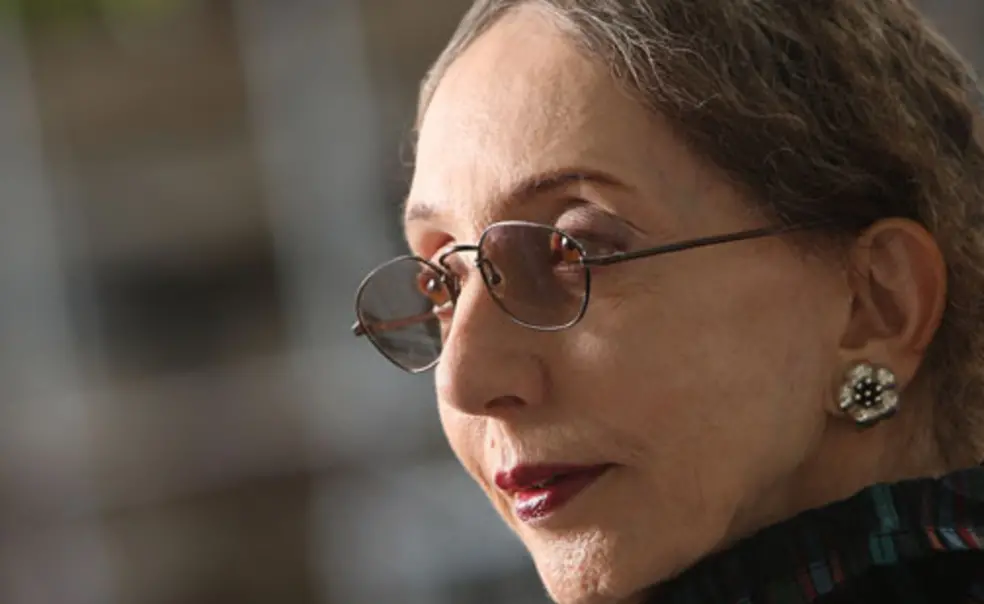Acclaimed author Oates to retire from University
This is a corrected version of an article published in the March 6, 2013, issue. The correction appears at the end of the story.
Joyce Carol Oates, one of the country’s most famous living novelists, will retire after 36 years as a professor in Princeton’s creative writing program, teaching her final writing seminar in the fall of 2014.
Oates, 74, the Roger Berlind ’52 Professor of the Humanities, said she reluctantly accepted a retirement package that encourages senior faculty to phase out their teaching with three years of half-time work before leaving. She is teaching this semester at the University of California, Berkeley. Before she departs, she is publishing a novel set at Princeton — a supernatural journey through the ivory tower, called The Accursed, which comes out in March.
The novel is the latest installment in Oates’ astounding volume of work — more than 50 novels; 36 collections of short stories; three dozen children’s books, plays, volumes of poetry, and nonfiction books; and even the libretto for an opera. She also is a legend in the classroom, with many of Princeton’s young writers clamoring to study with her.
Elise Backman ’15 got in line outside New South at 5 a.m. one day last spring to land one of the 10 spots in Oates’ creative writing seminar. Students say her feedback can be blunt. Alex Gansa ’84, co-creator of the TV show Homeland, told The Daily Princetonian he recalled Oates reading the first 11 pages of his thesis project, a novel, and telling him, “Well, this isn’t very good, is it?” She also can be devoted, reading drafts of Jonathan Safran Foer ’99’s thesis project every two weeks until the novel — later published as Everything is Illuminated — was finished, Foer told The Guardian of London.
In class, Oates is funny and inquisitive about her students’ lives, a contrast to her sometimes-frosty demeanor at the many talks and book signings she does. She can be freewheeling, recently launching a Twitter account from which she sends out witty observations several times a day.
Her 19th-century work ethic, as many have dubbed it, may come from her hardscrabble childhood on a farm in upstate New York, where Oates attended a one-room schoolhouse and went to Syracuse University on a scholarship. Starting in high school, she began “consciously training myself by writing novel after novel and always throwing them out when I completed them,” she told PAW in 1979. Her first novel, With Shuddering Fall, was published when she was 26, and a National Book Award for them came just six years later. In the following decades, the response to her work often seesawed between high praise and disdain.
The Accursed is an anomaly, a book 30 years in the making. Oates wrote the original manuscript in the early 1980s and has been revising it ever since. It required extensive research on the era of Woodrow Wilson 1879, which she did herself. “I’ve never had a research assistant,” she noted.
The novel begins in the summer of 1905, when strange things are happening. A girls’ school is overrun by snakes, and a Princeton student is found dead with bite marks on his throat, his body drained of blood. A curse is afflicting the town’s most prominent citizens: Wilson, the University president, who resorts to a Ouija board to learn the future; Grover Cleveland, retired to Princeton from the White House, who collapses after seeing a ghost; and a philosophy professor who is urged by Sherlock Holmes to murder his infant son because he is the demon’s spawn.
During her 50-year writing career, Oates has embraced a range of styles and subjects, from sweeping family sagas to fictional treatments of historical figures to gothic novels such as The Accursed, which Publishers Weekly called a stew of “vampires, demons, angels, murder, lynching, beatings, rape, sex, parallel worlds, Antarctic voyages, socialism, sexism, racism, paranoia, gossip, spiritualism, and escalating insanity.” Though considered a literary novelist — and frequently mentioned as a candidate for the Nobel Prize in literature — Oates has produced many works in the suspense and horror genres and received the Bram Stoker Award for Lifetime Achievement from the Horror Writers Association.
Oates said her new novel is an exploration of “a completely oblivious, blind, self-satisfied and self-congratulatory, white, Protestant, affluent society and community, which was Princeton at that time.” Wilson congratulates himself for inviting Booker T. Washington to lunch at Prospect House, and deems it audacious of Paul Robeson’s father to ask that Wilson admit his son to the University (which he refuses to do). He laughs at the “ridiculous notion” that blacks and women ever will attend Princeton. (It is true that Wilson invited Washington to his inaugural in 1902. As for Robeson, he was 7 years old in 1905, the year The Accursed takes place.)
Supernatural forces unleashed on the rich, white Princetonians are retribution for their bigotry. “I hope it’s an entertaining novel, and that these deeper themes will come up in a subtle way,” Oates said.
Princeton has not figured prominently in Oates’ work, though she has lived there since 1978. She and her first husband, Raymond Smith, together ran the literary magazine Ontario Review until his death in 2008, which she chronicled in her memoir A Widow’s Story. A year later, she married Charles Gross, a Princeton professor of psychology.
If there is a silver lining to her retirement, it may be that she will have even more time for her writing.
“She lives to write,” said Daniel Halpern, a longtime friend who has been her editor at Ecco Press since 1999. Halpern can’t envision that Oates ever would retire from writing in the manner of Philip Roth, who recently announced that he had stopped practicing his craft at 77. “If you took that away, she’d be lost. She would never stop.”
For the record
Professor Joyce Carol Oates will teach her last class at Princeton in the fall of 2014 and retire the following July. A March 6 Campus Notebook story included an incorrect date that was provided to PAW.



![NB-OatesLede.jpg Oates says her new novel explores “a completely oblivious, blind, self-satisfied and self-congratulatory, white, Protestant, affluent society and community, which was Princeton at that time [1905].”](/sites/default/files/images/content/NB-OatesLede.jpg)










3 Responses
Roger Derby ’54
10 Years AgoA different Princeton
Perhaps Princeton changed between 1895 and 1905. What I know of my maternal grandfather, Linsly R. Williams 1895, doesn’t jibe with Joyce Carol Oates’ description of 1905 (Campus Notebook, March 6). According to my grandmother, her husband was so poor when he attended Princeton that he had only one pair of trousers. When it was being cleaned, he stood around wrapped in a blanket. Following graduation, he became a physician and devoted most of his life to matters of public health. His specialty was tuberculosis.
In an obituary written by Andrew Imbrie, the class secretary, Dr. Williams is credited with prolonging “the lives of untold thousands.” Near the conclusion, Mr. Imbrie writes: “His classmates pay honor to the memory of one in whose great public service they take pride ... .”
Susan J. Wolfson, professor of English
10 Years AgoA professor’s warmth
Please note “reluctantly” in the first sentence of PAW’s story (Campus Notebook, March 6) on the retirement of Joyce Carol Oates. For more than 30 years, she has been cherished here as an internationally admired writer, who in turn has cherished her students. I was shocked to read of “her sometimes-frosty demeanor at the many talks and book signings she does.”
I’ve seen Joyce Carol Oates on these many occasions; she is unfailingly warm, often in good-humored (sometimes wry) conversation with the audience long after many others of her celebrity would have left the stage and left the building — an affability that continues in the more casual mixers after. She is also so in public when approached by fans. When she was a guest at Rutgers, everyone remembered her not only for this congeniality, but also for her generosity in meeting separately with undergraduates eager to converse with her.
This is also someone who is so ethically and professionally available to civic groups and reading clubs in remote, often bleak, locations around the country that she travels frequently for reading events — with audiences thrilled by her accessibility, as many a local newspaper account makes clear.
It may be that PAW has its own evidence, but to report “sometimes frosty” as a recognizable persona in Joyce Carol Oates seems perverse, even gratuitously hurtful enough to compromise “reluctantly” as her mood of departure (given this reluctance, why can’t her departure be delayed, even?). It would be understandable if PAW’s widely published remark made her less reluctant. An apology is due both to Joyce Carol Oates and to the readers of PAW.
Barry Qualls
10 Years AgoA professor’s warmth
Re: the characterization of Joyce Carol Oates in the March 6 issue (“her sometimes-frosty demeanor at the many talks and book signings she does”): Can you have watched Joyce Oates at readings and book signings? I have seen her in talks from Shrewsbury, N.J., to Santa Fe, N.M., and at Rutgers (at least twice). I marveled at the generosity of attention she gave to those in the audience who had come — many from long distances — to hear and meet her. Her genuine warmth was always in evidence, especially in the interest she takes in younger members of the audience.
Whatever characterizations apply to Joyce Carol Oates, “sometimes-frosty demeanor” toward the public never will be one of them. Princeton and New Jersey, not to mention the nation, are in her debt for novels that have chronicled the ways we live.
To (mis)characterize Joyce Oates in the way the author did is a gratuitous insult unbefitting PAW and surely unbefitting a faculty member whose teaching and writing have distinguished the University for more than three decades. You owe her an apology.